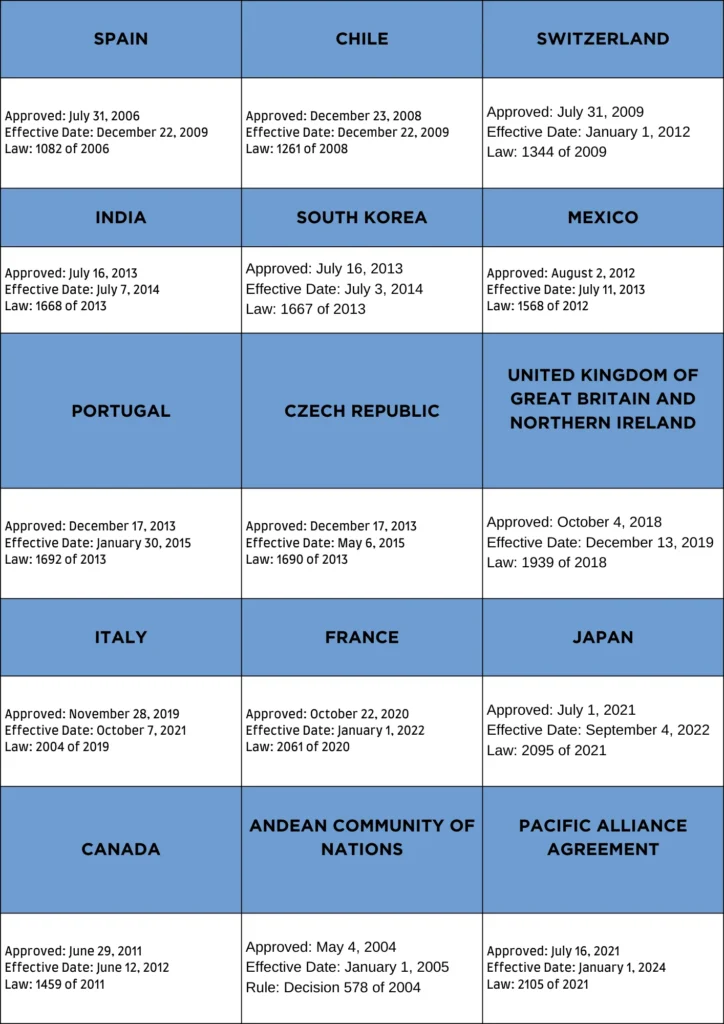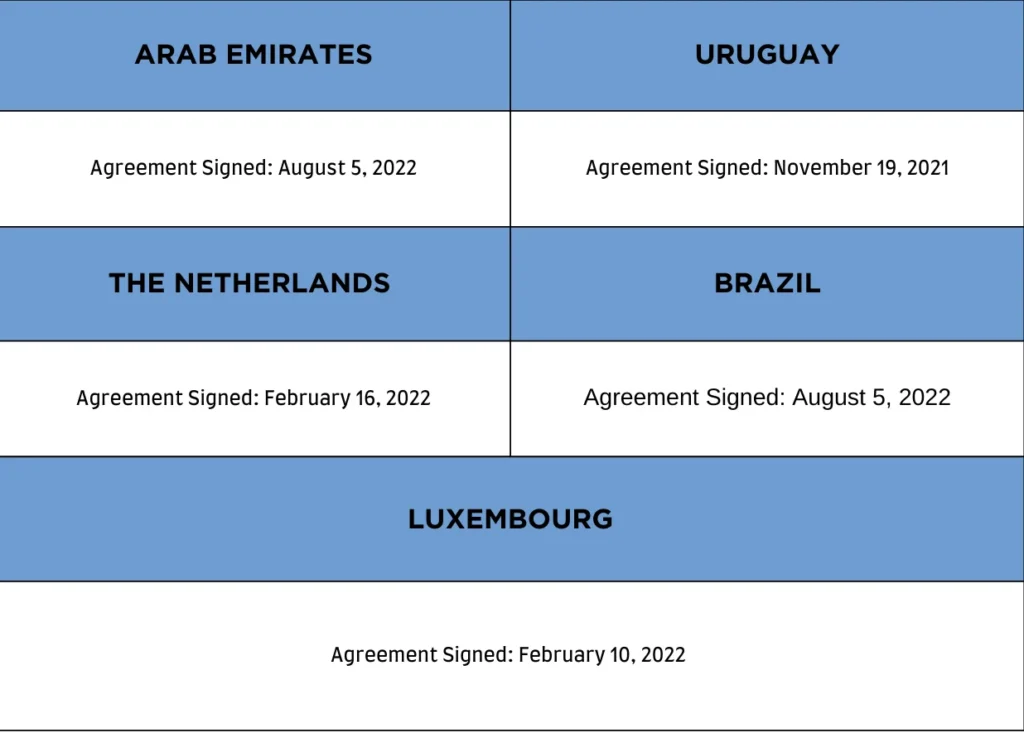COLOMBIAN TAXES FOR FOREIGNERS: 2025 COMPLETE GUIDE
Colombia is becoming a preferred choice for foreigners, not just as a tourist destination but also as a permanent home.
Relocating to a new country is a decision that requires careful planning and key considerations, like: understanding the local culture, adapting to the climate, learning the language, etc.
Additionally, it’s crucial to address regulatory and legal requirements, such as immigration and tax obligations.
If Colombia is your chosen destination, it’s essential to comply with its immigration and tax regulations. You need to familiarize yourself with Colombia’s tax system for individuals and ensure compliance with the applicable tax laws as a foreigner.
While this can seem complex (and we sure get it), we have designed this comprehensive guide for taxes in Colombia for foreigners in 2025, that will definitely help you navigate these requirements with confidence.
ARE YOU A TAX RESIDENT IN COLOMBIA?
First things first, to get familiar with the Colombian tax law you have to be sure if you are considered as a tax resident to the country.
According to Colombian law, an individual is considered a tax resident if:
- They have stayed in the country (continuously or not) for more than 183 days (taking into account entry and exit dates) within a period of 365 consecutive days. If the 183-day period covers two different calendar years, the individual would be considered a Colombian taxpayer for the second year.
Here, the days count even from the day you arrived in the country and the day you left, and important to say, it doesn’t matter on which month you arrived, it will be counted on a period of exactly 365 days, even for different years.
- If they are related to the foreign service of the Colombian state.
- Or, if they are Colombian nationals, not only if they were actually born in the country but also because of their condition, this is, foreigners who now own a Colombian “cédula”, or ID.
For this particular category there are also some other conditions attached to it; first, when 50% or more of the individual’s income comes from a national source, when 50% or more of their assets are administered in Colombia, when 50% or more of their assets are understood to be owned in Colombia, if they have not been yet able to prove that they reside at another country OR if their place of residency is considered as tax haven country to the Colombian law.
So for foreigners it is just enough to be considered as a tax resident the fact that you resided more than 183 days in the country, unless of course, you already are a foreigner who is considered as a national, belonging to that last previously explained category.
So you are a tax resident, what's next?
Now, you must know that being a tax resident in Colombia does not automatically mean you are required to report your income.
Income tax is a tax that only applies to natural persons, employees or self-employed, who must pay it to the state based on their salary, earnings, commissions, and other income marked on the previous year.
So, your tax return is basically the information that the DIAN (the Colombian Tax and Customs National Authority) requires you to submit in order to calculate your income tax obligation.
The fact that you are required to report your income or not will finally depend on your income itself, not relying only on your tax residency, since you can be a tax resident but not required to declare your tax income.
The income statement you present is based upon the economic transactions of your previous year, for example, your income statement of 2025 will be based on your movements of 2024.
Foreigners classified as tax residents in Colombia are required to pay income tax on earnings from both domestic and international sources, as well as on assets owned inside and outside the country—including real estate, vehicles, and bank accounts.
However, this doesn’t necessarily mean declaring income earned abroad is obligatory.
Double taxation agreements and tax credits for payments made in other countries often mitigate these obligations, as we will talk about further below.
It’s important to note that foreigners who qualify as tax residents are subject to the same income declaration rules as Colombian nationals.
This being said, natural persons that are required to declare income tax in 2025, are those whose:
Gross equity at the end of the 2024 fiscal year is equal to or greater than $211,792,000 cop.
Income of the taxable year is either $65,891,000 COP or equal to it.
Credit card payments accounted for a total amount of more than $65,891,000 COP.
Total value of purchases and consumption is equal to or more than $65,891,000COP.
Total value of accumulated income from bank appropriations, deposits, or financial investments is at least $65,891,000 COP.
Additionally, when you are a resident of Colombia, it is necessary to file a tax return in addition to the income tax return, and this consists of an informative tax return called: Declaration of Assets Possessed Abroad.
TAXES TO PAY IF I AM A FOREIGNER BUT NOT A RESIDENT IN COLOMBIA
If you are a foreigner and do not qualify as a fiscal resident in Colombia, it’s essential to understand your tax obligations.
This applies, for instance, if you have not stayed in the country for more than 183 consecutive or cumulative days within a 365-day period.
In such cases, your tax responsibilities are limited to income earned in Colombia and assets you own within the country.
Taxes You Need to Declare as a Non-Resident
Income Tax: You are only required to declare income generated in Colombia. Income from other countries is not taxable in Colombia, which is a key distinction compared to fiscal residents, who are taxed on their global income.
Assets in Colombia: If you own properties, vehicles, or have money in Colombian bank accounts, these must also be included in your tax declaration.
Limits and conditions for tax declaration
As a non-resident, you are subject to the same thresholds as residents regarding income tax declarations. For example:
- If your total bank deposits, financial investments, or transfers exceed 1,400 UVT (approximately $69,718,600 COP), you must file a tax return, even if you are in the country only as a tourist.
Permanent establishments and tax obligations
If you own one or more permanent establishments or branches in Colombia (e.g., a physical location where you conduct business), you must declare income for each of these establishments.
For instance, consider a digital nomad who decides to open a coworking space during their stay in Colombia to provide workspaces for others.
Even if this person is not a resident, the operation of a fixed business in Colombia requires them to file the corresponding tax return.
Is there a difference between paying and declaring income?
Yes! filing is different from paying.
You can file your income tax return if you have complied with the requirements set forth above (tops); however, it happens very often, and depending on the particular cases of each person, the return does not necessarily result in a balance to be paid.

INCOME TAX DEADLINES
For the income statement of natural persons in Colombia, the first step is to take a look at the DIAN 2025 tax calendar.
It is set between August 12/2025 and October 24/2025, that the natural person who meets the previously detailed criteria is required to file their tax return.
The due date for the declaration and payment appears on the dates shown below, taking into account the preceding two numbers of the NIT corresponding to the RUT, (your tax identification numbers). It is very important to do it before the established date and protect yourself against possible fines.
Last digits of your NIT and deadline to declare:
| DIGITS | DEADLINE | DIGITS | DEADLINE | DIGITS | DEADLINE | DIGITS | DEADLINE |
|---|---|---|---|---|---|---|---|
| 01 and 02 | August 12 | 27 and 28 | September 2 | 53 and 54 | September 19 | 79 and 80 | October 9 |
| 03 and 04 | August 13 | 29 and 30 | September 3 | 55 and 56 | September 20 | 81 and 82 | October 10 |
| 05 and 06 | August 14 | 31 and 32 | September 4 | 57 and 58 | September 23 | 83 and 84 | October 11 |
| 07 and 08 | August 15 | 33 and 34 | September 5 | 59 and 60 | September 24 | 85 and 86 | October 15 |
| 09 and 10 | August 16 | 35 and 36 | September 6 | 61 and 62 | September 25 | 87 and 88 | October 16 |
| 11 and 12 | August 20 | 37 and 38 | September 9 | 63 and 64 | September 26 | 89 and 90 | October 17 |
| 13 and 14 | August 21 | 39 and 40 | September 10 | 65 and 66 | September 27 | 91 and 92 | October 18 |
| 15 and 16 | August 22 | 41 and 42 | September 11 | 67 and 68 | October 1 | 93 and 94 | October 21 |
| 17 and 18 | August 23 | 43 and 44 | September 12 | 69 and 70 | October 2 | 95 and 96 | October 22 |
| 19 and 20 | August 26 | 45 and 46 | September 13 | 71 and 72 | October 3 | 97 and 98 | October 23 |
| 21 and 22 | August 27 | 47 and 48 | September 16 | 73 and 74 | October 4 | 99 and 00 | October 24 |
| 23 and 24 | August 28 | 49 and 50 | September 17 | 75 and 76 | October 7 | ||
| 25 and 26 | August 29 | 51 and 52 | September 18 | 77 and 78 | October 8 |
Take a look at the full tax calendar in the official DIAN’s website.
What happens if I don't file my tax return or if I do it late?
Among the consequences of not declaring your tax income or declaring it outside the established calendar period dates, you may face some of the following:
- If you file your income tax return after the deadline, you will face a late filing penalty, known as the “sanción por extemporaneidad.” This penalty amounts to 5% of the tax due and increases for each month or fraction of a month between the payment deadline and the date you file your tax return.
- In 2025, the minimum penalty for non-compliance or errors with the DIAN is set at $498,000. This means that even filing your return just one day late would require you to pay this amount, even if your tax return shows no amount due.
Keep in mind that, that these penalties could also get higher if not addressed in time, so make sure you pay attention to the deadlines.
WEALTH TAX
You must also be aware that there are certain individuals and entities subject to what is called: permanent wealth tax in Colombia.
According to Law 2277 of 2022, wealth tax applies to those with a net worth equal to or exceeding 72,000 UVT ($3.585.528.000 for 2025). The detailed criteria includes:
- Natural persons and illiquid inheritances (estates of deceased individuals not yet distributed to heirs) who are subject to income tax and complementary taxes or who declare under substitute income tax regimes.
- Non-resident natural persons, both Colombian nationals and foreigners, with assets located in Colombia, except where exemptions are provided by international treaties or domestic laws.
- Non-resident natural persons, Colombian or foreign, who own assets indirectly through permanent establishments in the country.
- Illiquid inheritances of non-residents who, at the time of death, held assets within Colombia.
- Foreign companies or entities not subject to income tax in Colombia but holding assets in the country, excluding shares, accounts receivable, and portfolio investments. Taxable assets include real estate, yachts, boats, art, aircraft, and mining or oil rights.
However, legal entities that are income tax filers in Colombia are not obligated to pay wealth tax.

DOUBLE TAXATION TREATIES
When it comes to double taxation treaties, it is essential to understand that if foreign-source income comes from a country with which Colombia has a double taxation treaty, you will not be required to pay tax on that income in Colombia.
However, if a foreigner meets the requirements to file taxes or qualifies as a fiscal resident in Colombia, they must still submit a tax return.
This obligation applies even if there is no tax liability and may include the requirement to report foreign assets, if applicable.
In Colombia, several treaties of this type have been signed, and others are in the process of approval. Below, we provide detailed tables summarizing the agreements currently in force and those under formalization, along with key dates and the applicable regulations, offering a clear guide to the development of these treaties.
Treaties in force for 2025

Treaties under formalization process

We are here to help you
We get that Colombian taxes for foreigners may be complicated to understand or difficult to keep up with. This considering the bureaucratic processes, the dates, and even the language itself if you are not so much of a fluent Spanish speaker.
Nevertheless, if you ever consider living or investing in Colombia this information is vital and required for you to know, that’s why Nexo Legal can be your best ally on any tax related activities.
Don’t hesitate to get in touch with us to receive the guidance you need regarding your taxes in Colombia, we will be more than happy to answer your questions and help you from the first to the last step of the way.
Get started with a free case assessment
What will happen after you fill out this form?
After submitting the form, your case undergoes a comprehensive review by our team of specialist to assess its viability. Providing clear and concise information about your objectives accelerates this process.
Subsequently, a specialist will be assigned to your case, reaching out to you within a day to clear up details about your case and outline the next steps to help you achieve your goals.

Social Media
Connect with us
Phone: (+57) 315 3354174
direccioncomercial@nexo.legal
Calle 11 no. 43b – 50,
Parque Empresarial Calle Once
Oficina 407
Medellín, Colombia
Get started with a free case assessment
What will happen after you fill out this form?
After submitting the form, your case undergoes a comprehensive review by our team of specialist to assess its viability. Providing clear and concise information about your objectives accelerates this process.
Subsequently, a specialist will be assigned to your case, reaching out to you within a day to clear up details about your case and outline the next steps to help you achieve your goals.
